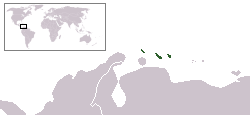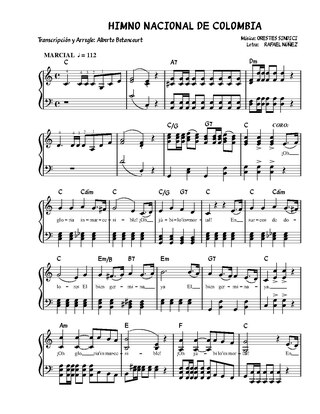
The Netherlands Antilles, also known as the Dutch Antilles, was a constituent Caribbean country of the Kingdom of the Netherlands consisting of the islands of Saba, Sint Eustatius, and Sint Maarten in the Lesser Antilles, and Aruba, Curaçao, and Bonaire in the Leeward Antilles. The country came into being in 1954 as the autonomous successor of the Dutch colony of Curaçao and Dependencies, and it was dissolved in 2010, when like Aruba in 1986, Sint Maarten and Curaçao gained status of constituent countries within the Kingdom of the Netherlands, and Saba, Sint Eustatius, and Bonaire gained status of special municipality of Netherlands as the Caribbean Netherlands. The neighboring Dutch colony of Surinam in continental South America, did not become part of the Netherlands Antilles but became a separate autonomous country in 1954. All the territories that belonged to the Netherlands Antilles remain part of the kingdom today, although the legal status of each differs. As a group they are still commonly called the Dutch Caribbean, regardless of their legal status. People from this former territory continue to be called Antilleans in the Netherlands.

Curaçao, officially the Country of Curaçao, is a Lesser Antilles island in the southern Caribbean Sea, specifically the Dutch Caribbean region, about 65 km (40 mi) north of Venezuela. It is a constituent country of the Kingdom of the Netherlands.

Bonaire is a Caribbean island in the Leeward Antilles, and is a special municipality of the Netherlands. Its capital is the port of Kralendijk, on the west (leeward) coast of the island. Aruba, Bonaire and Curaçao form the ABC islands, 80 km off the coast of Venezuela. The islands have an arid climate that attracts visitors seeking warm, sunny weather all year round, and they lie outside the Main Development Region for tropical cyclones. Bonaire is a popular snorkeling and scuba diving destination because of its multiple shore diving sites, shipwrecks and easy access to the island's fringing reefs.

The Marcha Real is the national anthem of Spain. It is one of only four national anthems in the world – along with those of Bosnia and Herzegovina, San Marino and Kosovo – that have no official lyrics. Although many different lyrics have been made for it in the past, it has never had official lyrics as a national anthem.

The national anthem of Bolivia, also known by its incipit "Bolivians, the Propitious Fate" and by its original title "Patriotic Song", was adopted in 1851. José Ignacio de Sanjinés, a signer of both the Bolivian Declaration of Independence and the first Bolivian Constitution, wrote the lyrics. The music was composed by an Italian, Leopoldo Benedetto Vincenti.
The "National Anthem of Honduras" was adopted by presidential decree 42 in 1915. The lyrics were written by Augusto Constantino Coello and the music composed by Carlos Hartling.

Papiamento or Papiamentu is a Portuguese-based creole language spoken in the Dutch Caribbean. It is the most widely spoken language on the ABC islands.

The "Paraguayan National Anthem" was officially adopted on 20 May 1846. The lyrics were written by Francisco Acuña de Figueroa under the presidency of Carlos Antonio López, who at the time delegated Bernardo Jovellanos and Anastasio González to ask Figueroa to write the anthem. The original composer of the song remains unclear, although the music is often attributed to Francesco Casale. Remberto Giménez rearranged the melody in 1933.

Kralendijk is the capital and main port of the island of Bonaire in the Caribbean Netherlands. The language spoken in the town is Papiamentu, but Dutch and English are widely used. As of 2017, the town had a population of 10,620. In Papiamentu, the town is often called Playa or "beach".
Same-sex marriage is legal in Aruba and Curaçao, two constituent countries of the Kingdom of the Netherlands, in accordance with a ruling from the Supreme Court of the Netherlands issued on 12 July 2024. In September 2021, a lower court in Curaçao ruled that preventing same-sex couples from marrying violates the equality provisions of the Constitution of Curaçao, but left the decision of whether to legalise same-sex marriage up to the Parliament. In December 2022, the Joint Court of Justice of Aruba, Curaçao, Sint Maarten, and of Bonaire, Sint Eustatius and Saba ruled on appeal that Aruba's and Curaçao's same-sex marriage bans were unconstitutional. The court order was set to go into effect on 7 March 2023 if not appealed to the Supreme Court; however, the governments of both Curaçao and Aruba subsequently appealed. On 12 July 2024, the Supreme Court upheld the lower court ruling, effectively legalizing same-sex marriage in Aruba and Curaçao with immediate effect.
The Anthem of Curaçao is the national anthem of Curaçao. Officially adopted on 26 July 1978, it consists of four verses, although only the first and last are commonly sung. Its theme is best summed up by the first stanza, praising the grandeur of Curaçao, as small as the island may be.

Rincon is one of the two towns in Bonaire, a special municipality of the Kingdom of the Netherlands. It is situated in the north of the island in an inland valley.

The Netherlands Antilles was an autonomous Caribbean country within the Kingdom of the Netherlands. It was dissolved on 10 October 2010.

The "Himno de Canarias", also known as the "Arrorró" ("Lullaby"), is the official anthem of the Canary Islands, Spain. The song was composed by Teobaldo Power. It was adapted as the community's anthem and incorporated as such on 30 May 2003.
Papiamento has two standardised orthographies, one used on the island of Aruba and the other on the islands of Curaçao and Bonaire. The Aruban orthography is more etymological in nature, while the other is more phonemic. Among the differences between the two standards, one obvious difference is the way the name of the language is written. In Aruba it is written Papiamento, while in Curaçao and Bonaire it is written Papiamentu. The governments of Curaçao and Aruba formally standardised orthographic rules in 1976 and 1977, respectively.

The Caribbean Netherlands is a geographic region of the Netherlands located outside of Europe, in the Caribbean, consisting of three special municipalities. These are the islands of Bonaire, Sint Eustatius, and Saba, as they are also known in legislation, or the BES islands for short. The islands are officially classified as public bodies in the Netherlands and as overseas territories of the European Union; as such, European Union law does not automatically apply to them.

The National Anthem of the Republic of Colombia is the official name of the national anthem of Colombia. It was originally written as a poem in 1850 by future President Rafael Núñez as an ode to celebrate the independence of Cartagena. The music was composed by Italian-born opera musician Oreste Síndici, at the request of Bogotan actor José Domingo Torres, during the presidency of Núñez, and with lyrics refined by Núñez himself, it was presented to the public for the first time on 11 November 1887. The song became very popular and was quickly adopted, albeit spontaneously, as the national anthem of Colombia.

Joceline Clemencia was an Afro-Curaçaoan writer, linguist, feminist and independence activist. She advocated for the Creole language spoken in Curaçao, Papiamento, to become an official language and was successful in the struggle, having created both language schools and texts to further its cultural significance. She was in favor of full independence of Curaçao from the Netherlands.

"Golden Rock" is the regional anthem of Sint Eustatius, which was established by the Island Council on July 29, 2004, and was officially ratified on October 8, 2010. The anthem was composed by Pieter A. van den Heuvel.

Ernesto Otilio "Netto" Petronia was an Curaçao-born Aruban businessman and politician. He served many times as a minister with multiple portfolios, and was Prime Minister of the Netherlands Antilles from 1969 until 1971.















